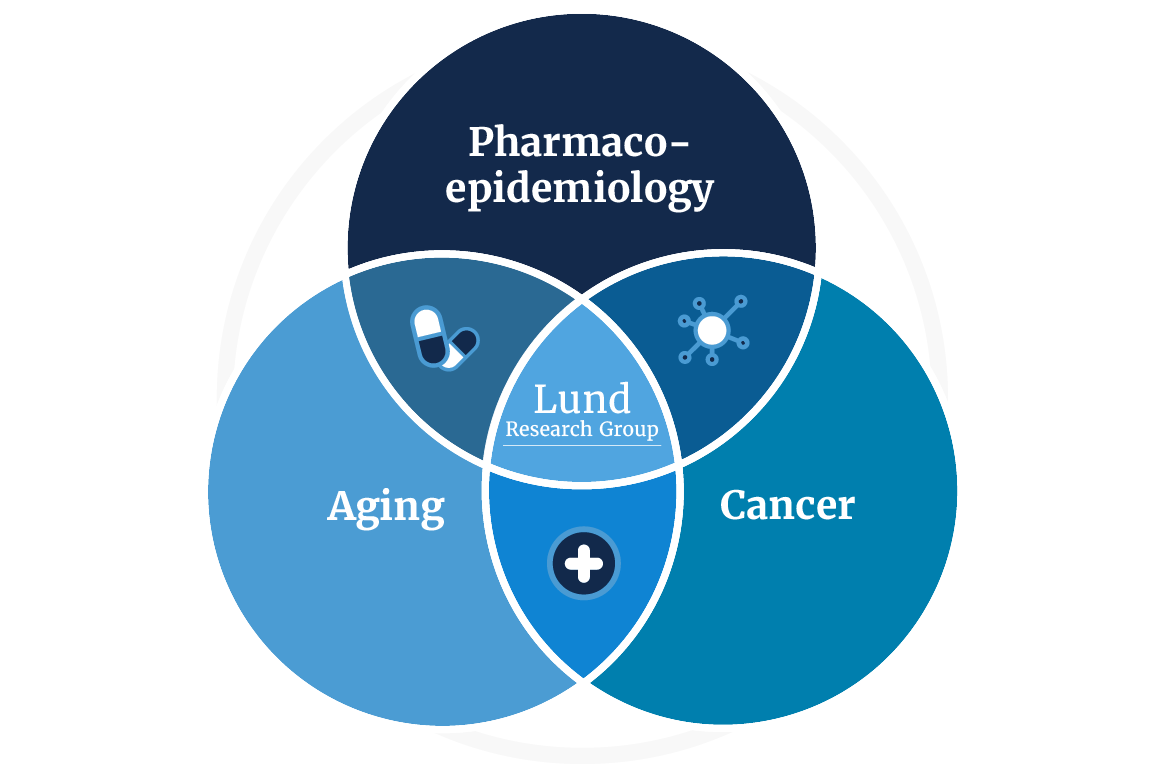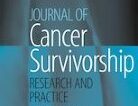Our research program can be visualized below as intersecting across disciplines of pharmacoepidemiology as the foundation, aging, and cancer research. As such, our work encompasses the sub-fields of geriatric pharmacoepidemiologic research, geriatric oncology research, and cancer health services and outcomes research.
Learn more about each of our research areas below:

Pharmacoepidemiologic Research
Methodologic contributions to the design and analysis of real-world data
The availability and accessibility of real-world data is rapidly increasing, including new sources of administrative claims, electronic health records, and disease registries. Studies that leverage these real-world data must take great care in defining important and feasible research questions, designing studies to answer those questions, and analyzing the data in a principled way that results in clear, interpretable findings. Our group’s methodological work seeks to innovate on existing study designs and analytic strategies using real-world data to improve the validity, robustness, and utility of study findings.
Geriatric Pharmacoepidemiologic Research
Validation of treatment and health status using administrative claims and registry data
Our group’s research also assesses the validity of large administrative and registry data for identifying a variety of cancer treatments (e.g., surgery, radiation therapy, hormone therapy and chemotherapy) and measures of geriatric health (e.g., frailty) among older adults. In the era of “big data,” these resources (and others, including electronic health records) are increasingly being used to evaluate the utilization, benefits and harms of medical interventions in clinical practice settings. However, misclassification of exposures, confounders, and outcomes can bias estimates of disease frequency and association, warranting continued monitoring and validation.
Examination of medication-related problems in older adult populations
Our group also examines medication-related problems in older adults, including those with cancer. As the prevalence of multiple chronic conditions increases with age, older adults (age 65+ years) must manage the use of multiple prescription medications. Each year, nearly 40% of older Americans report taking 5 or more prescription drugs (i.e., polypharmacy) in the prior 30 days. This is concerning given that polypharmacy is associated with increased risks of drug-drug interactions and adverse events. Thus, my work is aimed at describing the magnitude of potential medication-related problems in older adult populations with an eye towards evaluating their effects on health outcomes and the possibility of deprescribing.
Geriatric Oncology Research
Evaluating the effectiveness and safety of cancer treatments among older adults
As randomized controlled trials of cancer therapies often underrepresent older adults and those with multimorbidity, substantial uncertainties remain regarding their safety and effectiveness in medically complex populations. Our group’s research seeks to evaluate the effectiveness and safety of cancer therapies among older adults treated in clinical practice. Confounding is of particular concern in non-experimental comparative effectiveness studies of older adults diagnosed with cancer; however, bias can be (at least partially) mitigated through study design and analytic methods. The comparative effectiveness and safety of cancer therapies can vary across subgroups and highlighting these heterogeneous effects can lead to more personalized care.
Examination of medication-related problems in older adult populations
Our group also examines medication-related problems in older adults, including those with cancer. As the prevalence of multiple chronic conditions increases with age, older adults (age 65+ years) must manage the use of multiple prescription medications. Each year, nearly 40% of older Americans report taking 5 or more prescription drugs (i.e., polypharmacy) in the prior 30 days. This is concerning given that polypharmacy is associated with increased risks of drug-drug interactions and adverse events. Thus, my work is aimed at describing the magnitude of potential medication-related problems in older adult populations with an eye towards evaluating their effects on health outcomes and the possibility of deprescribing.
Cancer Health Services and Outcomes Research
Assessing patterns of care among cancer patients treated in clinical practice settings
Our group’s research describes patterns of care for cancer patients in clinical practice. Cancer-specific mortality for many different cancer sites have steadily declined over the past decades in the United States, in part due to advances in prevention, screening, and treatment. However, the dissemination and uptake of new cancer therapies varies according to patients’ age, race/ethnicity, socioeconomic status, and level of comorbidity, but also provider and practice type. The “appropriateness” of cancer treatment among older cancer patients is complex due to emerging therapies targeting specific mutations. As the population ages and new therapies are developed, uncertainties surrounding optimal treatment approaches, particularly for older cancer patients, will need to be addressed.



















